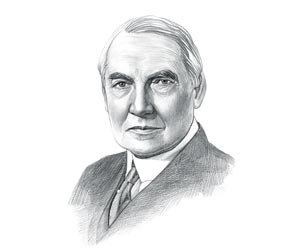|
The major accomplishments and the
famous, main events that occurred during the time that
Warren Harding was president included the 1922 agreement
to limit naval armaments signed by the US, France, Great
Britain, Japan, and Italy. The Mellon Plan, a package of
economic legislation, was introduced and the 1921
Emergency Quota Act used a percentage system to restrict
immigration.
The close friends favored by President Warren Harding,
referred to as the "Ohio Gang", were involved in bribery
and corruption. The Teapot Dome Scandal (1921-1923),
involved national security, oil companies and corruption
but the president died before he was implicated in the
scandal. Warren Harding
died of a stroke on August 2, 1923, aged 57. The next president was
Calvin
Coolidge.
Birthday:
November 2, 1865
Place of Birth:
Ohio
Political Party:
Republican
Nickname:
President Hardly
Number: 29th
President
Vice President:
Calvin Coolidge
Age at Inauguration:
55
Height: 6 feet
Weight: 173
pounds
First Lady:
Florence Harding
Religion:
Baptist
Date of Death:
August 2, 1923
Date of Warren
Harding
Presidency: March 4,
1921 to August 2, 1923
The Nickname of Warren Harding: President Hardly
The nickname of President Warren Harding provides an insight into
how the man was viewed by the American public during his presidency.
The meaning of the derogatory nickname "President Hardly" refers to
his lack of decisiveness and his inability to make hardly any
important or controversial decisions during his presidency.
Character and Personality Type of Warren Harding
The character traits of President Warren Harding can be described as
quiet, generous, humble and kind. Warren Harding had quite a
low self-esteem and sought the good opinions and praise from people
which led to his difficulty in making contentious decisions. It has been speculated that the Myers-Briggs
personality type for Warren Harding is an ISFP (Introversion, Sensing,
Feeling, Perception). A quiet, easygoing character with a a "live
and let live" approach to life. A perfectionist, loyal to values and
beliefs. Warren Harding Personality type: Practical, action-oriented and
considerate.
Accomplishments of Warren Harding and the Famous Events during his Presidency
The accomplishments of Warren Harding and the most famous events during his
presidency are provided
in an interesting, short summary format
detailed below.
Isolationism in the 1920's
Summary of Isolationism in the 1920's: The foreign policy of
Isolationism in the
1920's
was adopted by Warren Harding
that aimed at self-advancement to make the United States
economically self-reliant whilst retaining peace with other nations.
The American foreign policy of Isolationism was also adopted
by the Republican governments during the administrations
of President Coolidge. The foreign policy of
Isolationism was an attempt to isolate the US from the diplomatic
affairs of other countries by avoiding foreign entanglements,
entering into alliances, and limiting foreign competition by
imposing high import tariffs.
The Mellon Plan
Summary of the Mellon Plan: Andrew
Mellon was a highly successful banker who was first appointed the
United States Secretary of the Treasury by
President Harding.
He devised the
Mellon Plan, a package of economic legislation, which
reduced taxes on the wealthy and the corporations in America that
encouraged growth and led to the boom in stock market investments.
As part of the Melon Plan the Bureau of the Budget was established
in 1921 as a part of the Department of the Treasury by the Budget
and Accounting Act of 1921.
The 1921 Washington Conference
Summary of the Washington Conference : The
Washington Conference was an international disarmament meeting
called by
President Warren Harding that took place from November
1921 - February 1922. The Washington Conference was hailed as a
great success and led to three major treaties - the Four-Power
Treaty, Five-Power Treaty and the Nine-Power Treaty.
Tomb of the Unknown Soldier
Summary of the Tomb of the Unknown Soldier: The
Tomb of the Unknown Soldier
was dedicated on November 11, 1921
as
a monument to all those who had fallen during the Great
War.
In 1921 the body of an unidentified World War 1 soldier
was exhumed from a World War I American cemetery in
France and buried
in Tomb of the Unknown Soldier at Arlington National Cemetery.
1921 Emergency Quota Act
Summary of the 1921 Emergency Quota Act: The
1921 Emergency
Quota Act
used a percentage system to restrict immigration.
The Ohio Gang
Summary of the Ohio Gang: The
Ohio Gang
was a group of close friends favored by President
Warren Harding who were exposed for being involved in financial and
political scandals relating to bribery and corruption. Members of
the Ohio Gang abused their positions of power. By 1923, rumors of corruption in
President Warren Harding's administration and the Ohio Gang had begun to
surface he began to distance himself from his old
cronies.
The Teapot Dome Scandal
Summary of the
Teapot Dome Scandal: The
Teapot Dome Scandal involved prominent members of the Ohio Gang,
cabinet member Albert B. Fall, Secretary of the
Interior and Edwin C. Denby, Secretary of the Navy, in relation to
national security, oil companies and corruption.
Albert Fall and Edwin Denby received "loans"
(bribes) to lease land in Teapot Dome and Elk Hills to oil
companies. President Warren Harding died unexpectedly of a heart
attack on August 2, 1923. His reputation ruined by the activities of
the Ohio Gang. |

